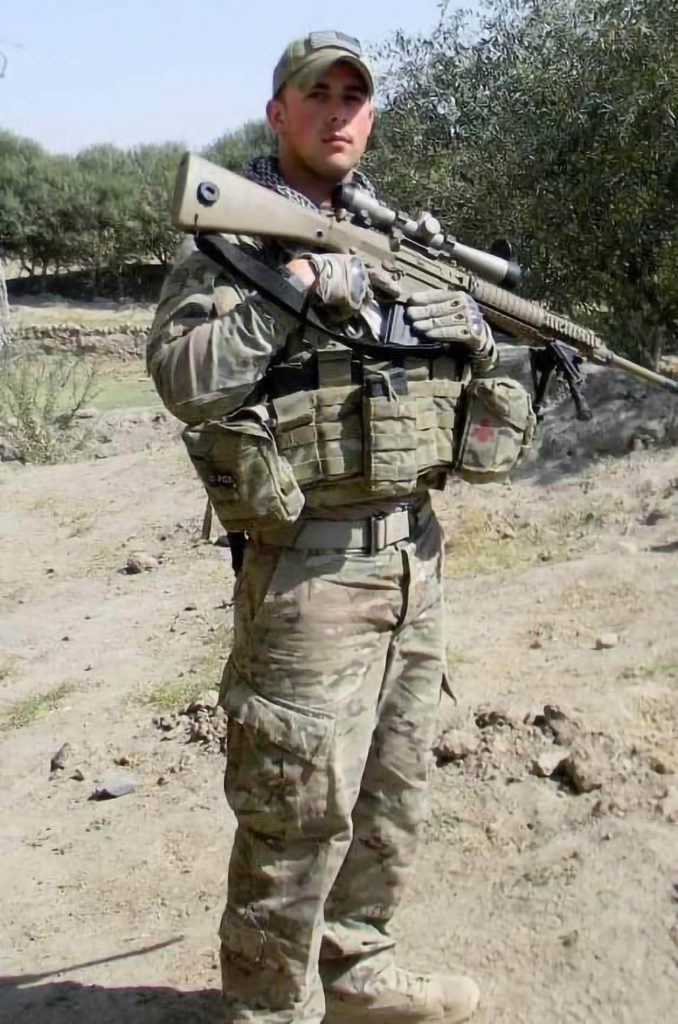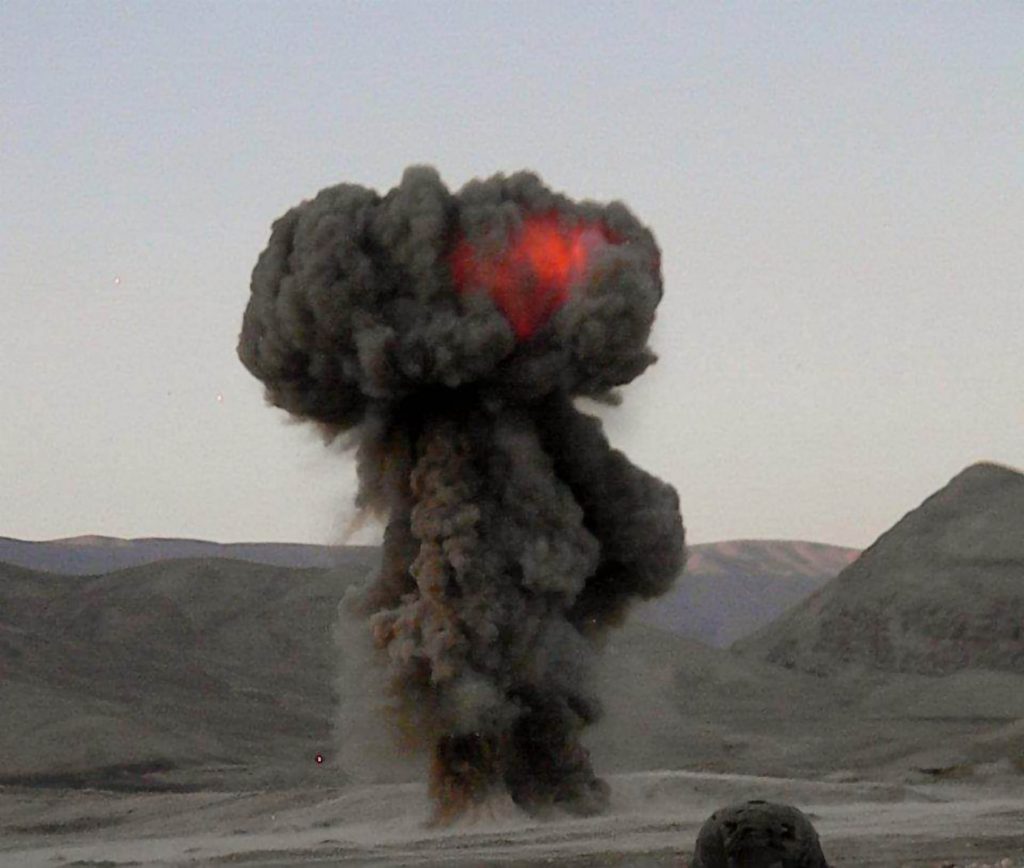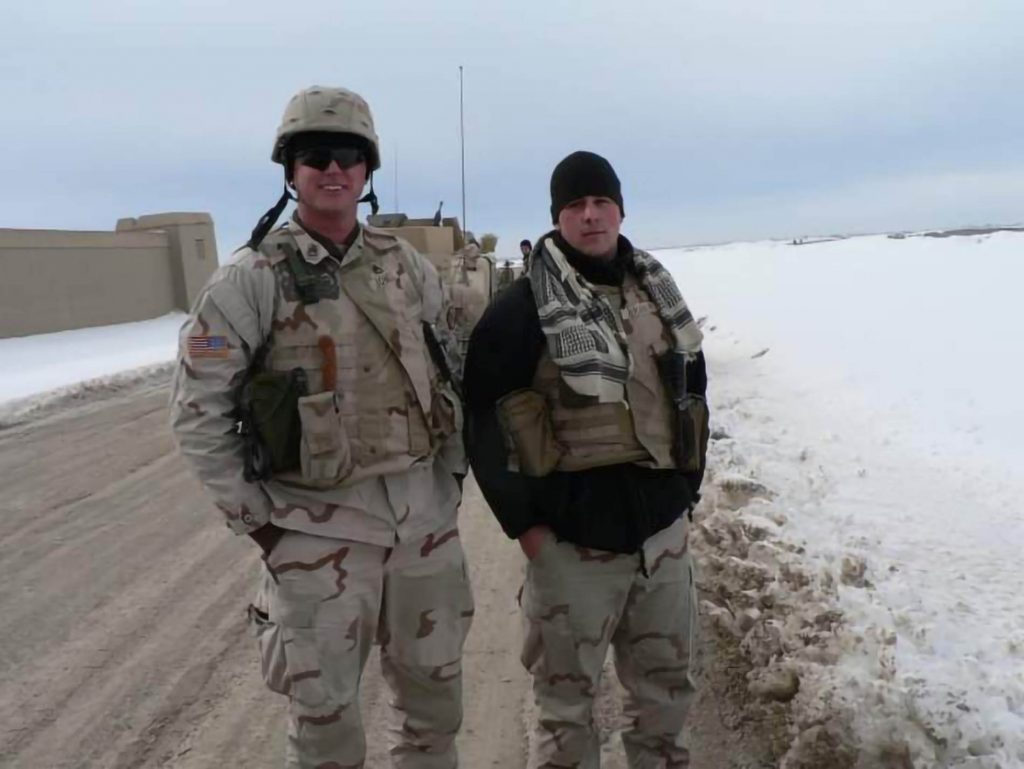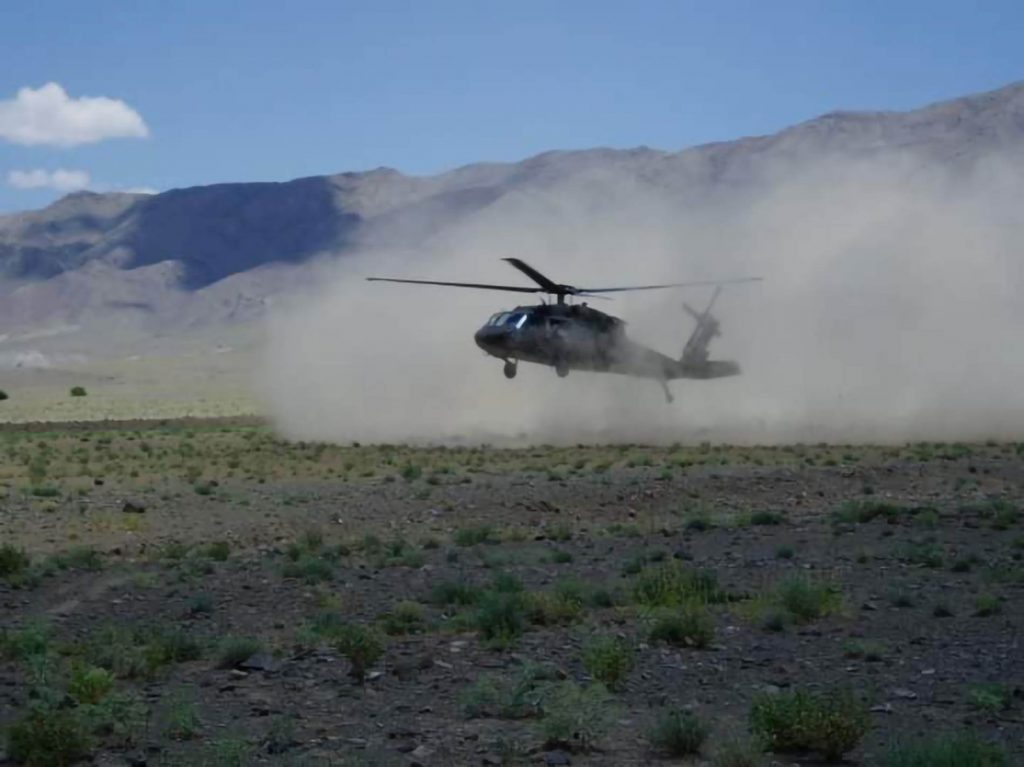Schyular Branum experienced the horrors of war in Afghanistan but kept on serving
The dates and details are seared into the soldier’s memory, and they roll off his tongue as easily as what he ate this morning for breakfast…
August 18, 2005: The afternoon he heard a boom a half-mile down a riverbed, coughed through a dust storm to reach a wreckage, and helped comfort U.S. Army 1st Lt. Laura Walker as she drew her final breaths.
March 12, 2006: The early evening a sudden click on the road in the Pech River Valley lifted and twisted his convoy’s lead Humvee, killing four of his brothers-in-arms and ushering in the most harrowing night of his life.
September 3, 2007: Labor Day, back home, when weeping overcame him as fireworks began to pop at Knoxville’s Boomsday celebration, and he realized he needed help.
July 22, 2010: The morning he gazed up at Rainbow Falls in the Great Smoky Mountains wondering if the thunderous cascade could cleanse him of the horrors of war.
September 17, 2016: A softly overcast afternoon where he said “I will” to a beautiful bride, while uncertain whether she would be able to cope with the fallout from his war memories.
July 2, 2020: The day his dad—a once painfully absent but now redemptively present father—suddenly passed from this world.
July 2, 2021: Yes, the same date, but a year later, the day the soldier’s first child, a daughter, is due, a poignant symmetry that he can’t quite wrap his head around.
And then there is the serene, blue-sky day when his journey to battle began in earnest: September 11, 2001.
On that epoch-making morning, Eddie Schyular Branum—who goes by his middle name, pronounced SKY-ler—sat in the student center at East Tennessee State University, aghast as somber news anchors spoke of jet planes toppling Manhattan’s Twin Towers, piercing the Pentagon, and plummeting into a Pennsylvania field.
At 4 p.m. that day, Branum walked into a U.S. Army office. “I want to fight,” the 18-year-old freshman said. The recruiter replied, “I have just the job for you.”
“They had hit us, and I knew I wanted to do my part,” recalls Branum, now seated in the neat upstairs office of his home on a Halls cul-de-sac, not quite halfway between Knoxville and the Maynardville/Big Ridge community where he was reared mostly by his beloved grandparents, Mamaw Mildred and Papaw Bill.
Several times during a 90-minute conversation, Branum expresses surprise that anyone would care about his service. “I don’t have much of a story,” he shrugs—but then he calmly, humbly unspools harrowing tale after tale of his battles between 2002 and 2012, during three deployments to Afghanistan, and of the struggles that have continued while haunted by PTSD, survivor’s guilt, and bouts of anxiety.

Branum was military-minded from an early age. He knew his Papaw had served as a U.S. Navy corpsman. “I was obsessed with Rambo movies—still love ’em.” A standout linebacker in football, the 2001 Halls High graduate attracted college attention but lost his focus. “I got a girlfriend and, well…I didn’t live up to my potential,” he says.
As a freshman at ETSU, Branum tended to favor parties over classrooms. When the towers fell, he leapt at the chance to serve. The recruiter “made it sound like an awesome job” to become a 12B combat engineer, “but he failed to mention you would be walking roads looking for IEDs [improvised explosive devices]” to disable. “IEDs became a big thing” in the Afghan fighting that began with the U.S. invasion of the Taliban-led nation in late 2001, Branum says.
After basic training at Fort Leonard Wood in the Missouri Ozarks, he was assigned to the army’s 10th Mountain (light infantry) Division at Fort Drum, New York. There he forged bonds of friendship that carried into combat and beyond. “When you’re over there, you’re actually not fighting for yourself. You’re fighting for your brother next to you. And you hope he has the same mentality.”
His first deployment to Afghanistan, 2002-04, was relatively routine. “It wasn’t the Wild Wild West; there was a lot of down time.” Working out of a combat outpost, his unit looked for mines, escorted infantry convoys, cleared the way for transports and officers. “We had our conflicts, but I didn’t lose anybody I was super close with. We did our mission, and we returned home.”
It wasn’t enough. Branum wanted to keep serving, so he re-upped and joined Company A of the 391st Engineer Battalion at Walter H. Lee U.S. Army Reserve Center in Asheville, North Carolina. After training at Fort Bragg, Branum’s reserve unit was deployed to Afghanistan in April 2005. He spent his 22nd birthday, April 12, at Bagram Air Base in Parwan Province. His job was the same, but the technology had advanced from mostly visual identification to operating a vehicle called a Buffalo, with a 30-foot robotic arm, claw, mounted camera, and sensors to dispose of IEDs.

Even so, this deployment proved more deadly. U.S. casualties had more than doubled, from 82 in 2003-04 to 181 in 2005-06. Two seminal dates stand out for Branum. The first is August 18, 2005, when 1st Lt. Walker and Sgt. Robert G. Davis were killed after a roadside bomb detonated near their vehicle a half-mile from where Branum had just seen them depart a base.
“We were the route-clearing package that day, but [the colonel] was in a hurry to get back to Kandahar,” and the riverbed had not yet been cleared, Branum says. “When we got there, Lt. Walker was still in the back of the Humvee. She was calm. She was talking to us, but she was white. The Medivac came in” but could not save her. “That was the first death I had seen like that, up close. It was shocking.”
The second is March 12, 2006. Leading to it, his reserve unit “had been in our scuffles but had come out unscathed,” he says. “We felt untouchable in a way.” They were in the Korangal Valley, a hotly contested, six-mile swath formed by the Pech River in Kunar Province, home to a series of U.S. military bases.
“I had been to every region of Afghanistan and survived,” Branum says. “This was a typical day. We probably were a little complacent. We were going home the next month. We made it up the valley. On the way back, we weren’t clearing. I heard a clap ahead. It was a fertilizer bomb, ammonium nitrate and diesel fuel, buried two or three feet. It hit dead center of the lead Humvee. It literally lifted and twisted it into two pieces. The rest is kind of a blur, trying to comprehend what had just happened.”
Branum was the turret gunner in the second vehicle, right behind the one that was hit and destroyed; he saw it all unfold. He jumped out of his vehicle and ran to fellow soldier, Staff Sgt. Joseph Ray, but he was already gone. Ray and two other soldiers—Sgt. Kevin “Big Ache” Akins and Sgt. Anton Hiett—were killed instantly. A fourth, Spc. Joshua Hill, survived for several hours that night—the unit was under fire, so a Medivac could not reach them—before succumbing to his wounds.
Branum pauses. “I really haven’t talked about March 12 in a while,” he says, looking toward the floor, where his cat is playfully pawing the straps of a backpack. He breathes a soft sigh and continues:
“Staff Sgt. Ray was thrown maybe 50 feet. He had one pinhole in the back of his neck, where shrapnel went in. Sgt. Akins was driving, pinned underneath the vehicle. Gone instantly. Sgt. Hiett, that was his first mission with us. He was impaled.
“They came in and hit us and hit us. We couldn’t get reinforcements. We were pinned down, sitting there with our dead buddies. Before Spc. Hill passed, he was talking to us just like you and me. He had a sense of calm. Then he kind of went to sleep. It seemed like that night lasted days. It got eerily quiet. We finally got pulled out. I don’t remember anything between that and being back at our base.
“Certain things trigger memories. Smells. There was a tree there. If I see a tree like that, it takes me back. The crazy thing about Afghanistan, it’s not all desert. In the north and east, it’s the most beautiful place you’ll ever see—but also the deadliest.”

Branum made it home. He received a Bronze Star and a Purple Heart, among other accolades. Back in East Tennessee, painful memories began to take a toll: Watching friends blown up. Firing on enemy combatants who could have included civilians. Chasing an enemy “trigger man” into a cave, firing in the dark, and hearing the air hiss out of his chest like a flat tire. “All of that will haunt you,” Branum says.
Still, “my mentality was I was fine. This ain’t gonna affect me.” Until Boomsday 2007, when the fireworks sounded like a machine gun. “When they went off, I broke down right in the middle of everyone. It was the first time I had a panic attack. I haven’t seen fireworks since. I knew something wasn’t right.”
He began having nightmares and flashbacks. He thought of his friends who had been killed. They were husbands. They had children. Why had he been spared?
To cope, he opted for self-therapy and hiking, walking some 900 miles in the Smokies, solo, over several years. “They say that war will turn a young man old. You leave a part of you over there. I wanted the peace and quiet. It was the opposite of war.”
Friends and family thought Branum was improving, but that was his “poker face,” he says. Inside he remained distraught. In 2010, despite protests from some loved ones, he enlisted in the Army National Guard and was sent to Afghanistan for a third deployment, 2011-12.
At this point, his voice grows quiet, his gaze steely: “I went back because I had no intention of coming home.” He wasn’t planning to take his own life; he just figured the odds would catch up with him, and he was resigned to dying in battle. “I was hard-core struggling mentally.” He also wanted to help protect parents and spouses so they could return home to their families.

But this time, the horrors he had experienced earlier eluded Branum. He made it home safely and would be honorably discharged in January of 2014 as a sergeant.
Life continued to unfold as it often does, a blend of joys and sorrows. He started formal counseling to work toward healing. He reconciled with his father, drummer Eddie Branum. “I started confiding in him. He wasn’t a good dad growing up, but he was an awesome dad as an adult. We had a unique bond. I did a lot with him.”
He met, dated, and married (in 2016) his wife Shawnee, a nurse. His precious Mamaw passed away. His career took off. Between his second and third deployments, Branum had trained to become a phlebotomist at East Tennessee Children’s Hospital, which led to a career in that field with LabCorp and a management role. “LabCorp has been great; they kept my job open for two years” when he went back to Afghanistan.
He began what he calls his “memorial arm,” a landscape of tattoos bearing the names of his fellow reservists who lost their lives on March 12. “They were my buddies.”
Branum’s dreams and flashbacks have lessened. “The thoughts stay there. I’m learning to control them.” Now and then, Shawnee awakens to find him having a nightmare. “She’ll tap me to wake up,” he says.
Last July 2, when his father died suddenly, Branum was hit hard. It’s still difficult to talk about. In October, he came home to find Shawnee smiling extra widely. He opened a cooler she had bought to find “two little baby moccasins and a pregnancy test. I was excited. I cried. The one person I wanted to call I couldn’t,” he says of his dad.
At their first obstetrician appointment, the doctor mentioned the due date: July 2—the date his father had passed in 2020. “I was like: you’re kidding?” Branum says. “It still hits me; I can’t believe it.”
Despite all of the challenges he faced and the painful memories he carries, Branum says, “I have no regrets about joining the military. It was by far the best decision I made. It grew me up. If I could do it all over again, I’d do it. I’m proud to be an American.”
